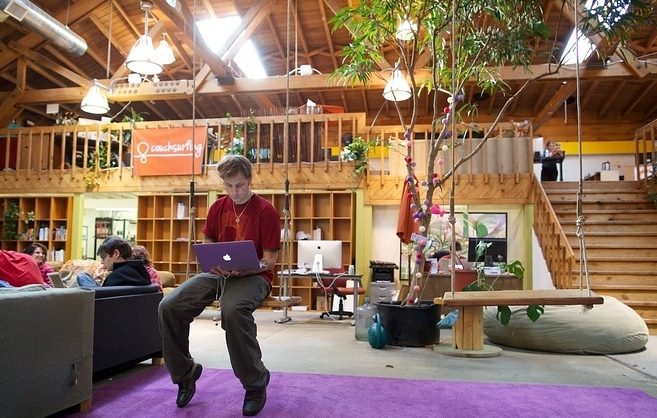I have been exposed to both corporate and startup cultures to realise how big of a gap exists between the two in terms of work ethic. As an old adage goes, nothing is ever one sided, especially when it comes to evaluating the way people run their businesses. Although there is an evident truth that the startup hype is booming everywhere, it’s become rather disruptive because of the ‘having fun’ spirit that is often overdone.
It is essentially the awesome perks that make a company desirable by many job seekers. However, those benefits don’t define any company’s value. There’s more to a business than free breakfasts and bean bags, it’s also absolutely not about having fun at work either. In that sense, startup culture is all about encouraging personal development and recognising individual influence within the team. Even giant companies like Google, Facebook and Samsung are still keeping that startup mentality: employees are valued equally as customers.
Considering how startups are reshaping the workplace towards a transparent and creative setting, corporations should also embrace these values to attract young talents. Here are 6 key factors that prove startups culture can create a more productive working environment.
1. An open-mindedness to individual voice.

Startups always entice employees from all departments to share their ideas and make sure that they are heard. Most corporates, however, tend to leave out on non-managerial inputs because of the assumption that people are expecting an increment rather than genuine devotion.
Big companies are wasting their own assets by overlooking this group of aspiring individuals who are eager to contribute but don’t have the deciding power in the organisation.
2. An employee can wear many hats to be any cog in the wheel.

For fresh grads who are still exploring the sea of professions for what they want to pursuit, a startup job will allow them to do exactly so. However, it is not always the case in the corporate world. Big companies hire people to do only what are stated in the job descriptions. The way it works is more suitable for someone who has clearly defined their career goal.
From a startup’s point of view, encouraging people to discover what they want to do differently is an effective way to generate unconventional ideas for the business. More importantly, it helps to make every day a different day for the employees so that they won’t have to wake up every morning contemplating calling it quits.
3. Project ownership.

Startups see themselves as a giant machine where each person is a part of an engine that works independently together (not without one another). They always ensure that the employees know exactly how their works influence the team’s overall success on any scale. Oftentimes, the ownership of a particular task or project that is assigned to individual is what motivates them to work to their full potential.
On the other hand, traditional corporate companies place their missions on the leaders alone, who will then make sure their orders are followed by everyone else to achieve success. That is not a bad thing, however, it lacks personal progress.
4. Having a relaxed dress code.

It’s been long perceived by people that a “proper job” comes with suit and tie. The truth is it’s only applicable if the business interacts with customers on a daily basis (for example, hoteliers, bank tellers…). Most startups have no dress code as it reflects the freedom of expressing one’s self and the more comfortable a person is, the more productive they can be.
5. Flexibility of office hours.

Yes, one of the glorious parts of startup culture is its flexible working hours. Depending on the industry and nature of the business, employees can arrive at the office at their preferred time frame (usually between 8–10am) and leave as long as they complete 8 hours of work. The biggest advantage of this system is that everyone can find time for important things that may require them to settle before arriving at work. Or simply to allow people to work at their most productive state as some are early birds while others are night owls.
It seems harder for a corporate to practice that since their population can reach up to a few hundreds or even thousands of employees. However, those big companies shouldn’t be too strict on office hours neither. Deducting one’s salary for being present 5 minutes late at work doesn’t do any good to employee retention.
6. Hierarchy aside, teamwork is the only way to move forward.

It is without doubt that hierarchy is the worst part of any corporate culture; as startups are aware of the negative impact that hierarchy has on its machinery, which directly translates to failure. A company can only be successful if the leader knows how to empower his or her employees. There is no way for a hierarchical structure to support a team’s goal.
We are moving towards a new phase of the business world with many unicorn companies slowly replacing traditional services providers: from tourism industry with Airbnb and Currenseek, transportation with Uber and Grab, financial services with fintech startups Lenddo and CompareHero, to communication with Snapchat and Slack.
It shows that the millennials are in dire need of a channel to unleash their creativity and live their dreams of becoming one of the breakthrough entrepreneurs in the field of their choice. Hence, more and more job seekers will turn to startups for a chance to discover what college can’t teach them and be prepared for their future entrepreneurship.
Corporate companies can’t keep taking the conventional path with a hope of building the next generation of young leaders. I believe that it’s the time for traditional firms to adopt the bright side of startup culture to attract young talents and nurture them, don’t you think?
This article was written and contributed by Linh Pham.
Feature Image Credit: Quora/CouchSurfing in San Francisco, California








